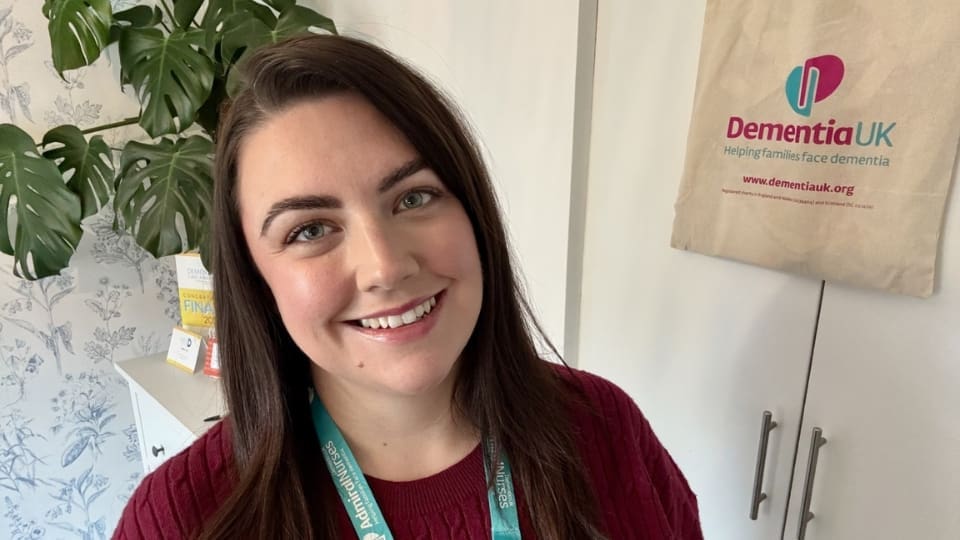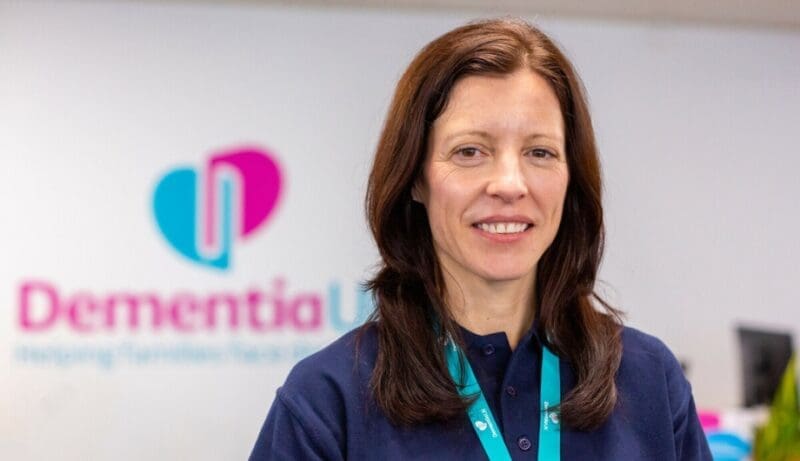
How to become an Admiral Nurse: Gemma’s career journey and tips
Admiral Nurse Gemma shares her career journey so far, her tips for becoming a specialist dementia nurse, and what she loves about her role.

Admiral Nurse Gemma shares her career journey so far, her tips for becoming a specialist dementia nurse, and what she loves about her role.
I’ve only been an Admiral Nurse for one year, but it’s such a breath of fresh air to feel like I’m helping people.
I support families on our Helpline and in virtual clinic appointments, which are available for anyone affected by dementia. I lend a listening ear, answer any questions they may have, offer advice and guidance, and signpost to services in their area for additional support.
Throughout the year, Admiral Nurses also get involved in various projects to build on their experience and knowledge in areas of interest. I present in Dementia UK’s ‘Dementia: what next?’ online series, which is designed to help families learn more about dementia and next steps after diagnosis. I also research how Admiral Nurses can get more visibility in Scotland, which is where I’m from. This is a great way to delve deeper into the areas of dementia care that I’m passionate about.
I didn’t have a career plan after graduating from my nursing university degree. At the time, dementia care wasn’t a particular interest of mine, so I began working in learning disability and mental health nursing until I eventually had the opportunity to work in a dementia ward at a hospital.
I thought that I’d learn from the experience and move onto something else. But that was 13 years ago, and I’ve worked in dementia care ever since.
I fell in love with the specialism and working with people affected by dementia. It gives me a sense of accomplishment that I’m making a positive difference in people’s lives.
When I heard about dementia specialist Admiral Nurses, I knew that it was going to be the next step for me. I’m really proud to be an Admiral Nurse.
I went straight to university from school to study nursing for three years.
After I graduated, even though I’d finished my course, my learning had only just begun. When I started working as a staff nurse, I discovered the type of nurse that I wanted to be, and which specialisms interested me most.
Since my first dementia care role in a hospital ward, I’ve worked in community settings, specialist roles, hospital-based care and care homes. I’ve learned something from each role, which has helped to prepare me for my role as an Admiral Nurse.
Over the years, I’ve worked with many wonderful nurses who have had different career journeys from mine. Some people go to college first to study and then complete a university course to qualify as a nurse. I’ve also worked with talented healthcare professionals who did their nursing training through their job.
I think the main driver to becoming a specialist dementia nurse is being passionate about supporting people living with the condition and their families.
To become an Admiral Nurse, you’ll usually need:
You can find current Admiral Nurse vacancies and requirements on our Careers page.
It’s lovely to work with Admiral Nurses who have their own experiences and specialties. We learn from each other.
I have regular opportunities to connect with other Admiral Nurses through online clinical supervision, Dementia UK’s Annual Forum and in person meet-ups.
Dementia UK’s Admiral Nurse Academy offers fantastic ongoing development opportunities. Admiral Nurses can access a range of online learning resources and our Summer School.
It’s a privilege to support families affected by dementia, I get to make a real difference in people’s lives.
Dementia care is multidisciplinary, and each specialty will have its own approach to supporting families. It’s important to reach out to other healthcare professionals, like occupational therapists, psychologists, dietitians and speech and language therapists, to gain a holistic understanding of dementia care.
Speak to team leaders about your aspirations to develop your training in this area. Organise placements within hospital and community-based settings while in training. Most people affected by dementia live in the community, with support from dedicated family members and carers, so it’s important to gain experience in a variety of settings.
Improving your knowledge and understanding is key. Continue to read new research published about dementia, which is often readily available, to help stay updated about the different approaches and theories surrounding dementia care.
Giving families the time to talk through their situation and listening to their concerns is so important. To be able to have that for everybody living with dementia is the dream. If you’re passionate about dementia care, just go for it.
If Gemma’s story has inspired you, explore our Admiral Nurse career opportunities or learn more about how to become an Admiral Nurse.

Admiral Nurse Gemma shares her career journey so far, her tips for becoming a specialist dementia nurse, and what she loves about her role.

Hannah Gardner, Consultant Admiral Nurse for Children and Young People, shares her key learnings from this year’s dementia conferences.